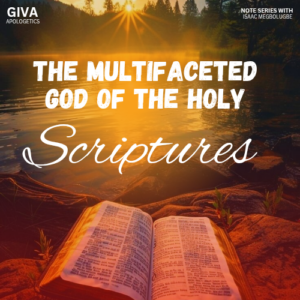
The Multifaceted God of the Holy Scriptures
Isaac Megbolugbe
January 7, 2025
Introduction
The Holy Scriptures, encompassing texts predating the Roman Catholic 66-book canon, offer a rich and complex understanding of God. This article explores four aspects of God’s nature: God’s essence, God’s revelation to creation, God’s relationship with humanity, and God’s role in governing heaven alongside redeemed humanity.
(1) God’s Essence
The Holy Scriptures describe God as a singular, all-powerful, and eternal being (Deuteronomy 6:4, Psalm 90:2). God is spirit (John 4:24) and exists beyond human comprehension (Isaiah 40:28).
(2) God Revealed to Creation
God’s presence is evident in creation (Psalm 19:1-4, Romans 1:20). The divine name, YHWH, signifies God’s connection to the natural world (Exodus 3:14-15).
(3) God Revealed to Humanity
God has consistently communicated with humanity, from the patriarchs (Genesis 12:1-3) to the prophets (Isaiah 6:1-5). The incarnation of God in Jesus Christ represents the ultimate revelation of God to humanity (John 1:1-14).
(4) God Governing Heaven with Redeemed Humanity
The Holy Scriptures envision a future where God dwells among redeemed humanity in heaven (Revelation 21:3-4). God will reign alongside glorified believers, exercising divine authority (1 Corinthians 6:2-3, Revelation 5:10).
Conclusion
The Holy Scriptures present a multifaceted God, encompassing God’s essence, revelation to creation, relationship with humanity, and future governance of heaven with redeemed humanity. This understanding of God’s nature has evolved through progressive revelation, culminating in the ultimate expression of God’s love and redemption through Jesus Christ.
References:
– The Hebrew Bible
– The Septuagint
– The Dead Sea Scrolls
– The New Testament
– The Apocrypha
– The Pseudepigrapha
The references provided are a selection of the many texts that comprise the broader Holy Scriptures.